The best romantic comedies to watch on HBO Max
Looking for a date night recommendation? Crazy Rich Asians and You've Got Mail are just some of the best romantic-comedy movies on HBO Max
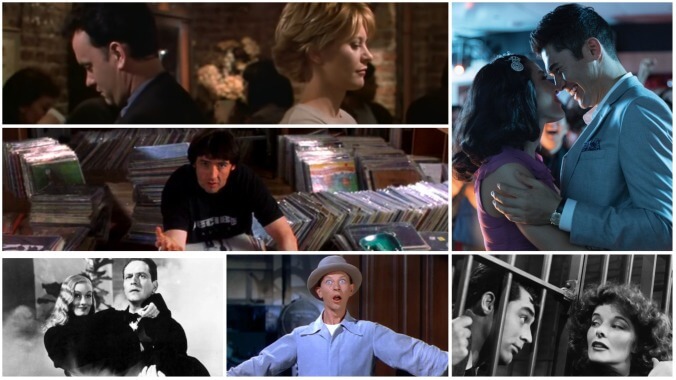
If you’re looking for the perfect date night movie, either in celebration of Valentine’s Day or anytime you’re in a lovey-dovey mood year-round, HBO Max is a great resource. Romantic comedy classics abound, from Bringing Up Baby to Oscar Best Picture-winning fare like The Artist. Best of all are the beloved tentpoles of the genre like Singin’ In The Rain or High Fidelity, the kinds of feel-good films worth revisiting over and over again. For the streaming platform’s best titles overall films, click here. But for HBO Max’s best available rom-com films, plus The A.V. Club’s writing on each, read on. Happy almost Valentine’s Day!
This list was most recently updated on January 27, 2023.
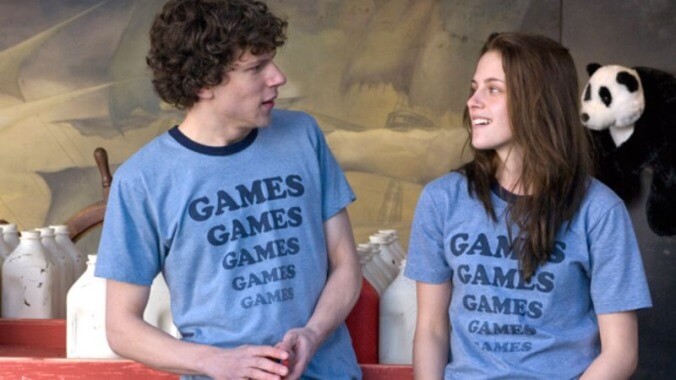
In , Jesse Eisenberg stars as a kinder, gentler version of the insufferable faux intellectual he played in The Squid And The Whale, a deep thinker in a superficial ’80s world where artsy pretensions don’t survive a long, boozy, pot-scented season in purgatory working at a second-rate amusement park. Eisenberg’s innocence is nicely matched by the coltishness of suddenly ubiquitous Twilight breakout star Kristen Stewart. Watching Eisenberg fall in love with Stewart is like watching the mating rituals of photogenic wild animals who care about books and interesting films. Greg Mottola’s follow-up to Superbad casts Eisenberg as a virginal recent college graduate who gets a shitty job running games at an amusement park as a way of passing time before his real life begins. At work, Eisenberg falls helplessly in love with a co-worker (Stewart), a brooding, intense young woman stuck in a go-nowhere affair with married man Ryan Reynolds. Mottola digs into the repertory company of Superbad producer Judd Apatow to score juicy supporting turns from Bill Hader, Kristen Wiig, and especially Martin Starr, who steals the film as Eisenberg’s acerbic friend. []
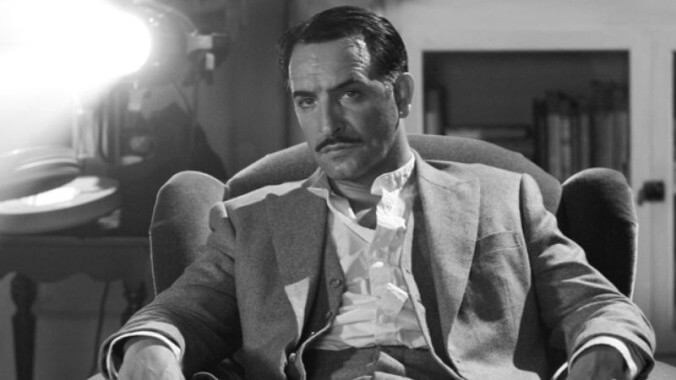
Jean Dujardin brings his usual million-dollar smile to the role of a silent-cinema star who’s on top of the world until the advent of talkies, which he dismisses as a fad, leaving the world to pass him by. Meanwhile, a starstruck fan he meets in a crowd (Bérénice Bejo) rockets to stardom, but never forgets her crush on him, and continues to admire him from afar (and sometimes a-near) as he slides toward irrelevance. By nature, The Artist is a charming romance, in which two naturally winning people are denied what they want just long enough to make audiences feel satisfied when everyone’s needs are finally met. It’s a beautifully shot, beautifully acted piece of fluff. []
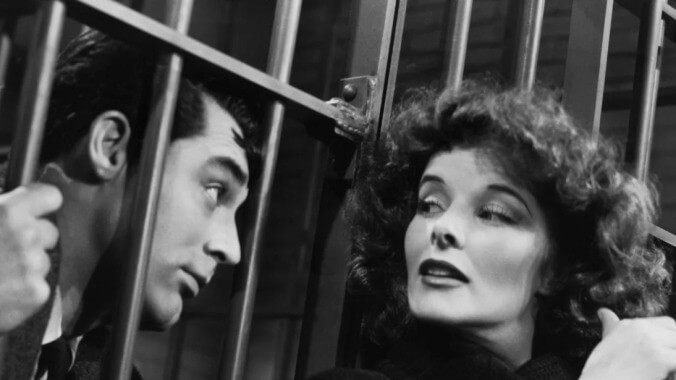
A love story about a paleontologist, a kook, a dog, a leopard, and a dinosaur bone, Bringing Up Baby is packed with so many gags that stars Cary Grant and Katharine Hepburn reportedly had trouble getting through takes without laughing, putting the movie behind schedule and over budget. Possessed by an overwhelming sense of comic energy, Howard Hawks’ screwball masterpiece heaps on misunderstandings, misadventures, perfectly timed jokes, and patter to the point that it’s easy to overlook how rich and fluid it is a piece of filmmaking, effortlessly transitioning from one thing into the next. The movie’s stick-in-the-mud/free spirit pair-up would go on to be imitated countless times, but never in a way that managed to capture the original’s sense of movement or its unique balance of pessimism and optimism. []
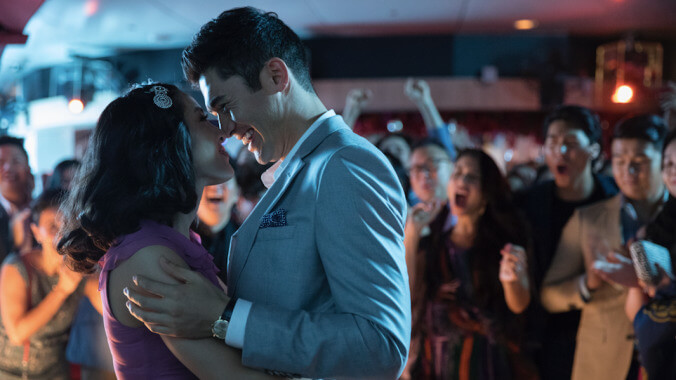
Constance Wu stars as Rachel Chu, a practical NYU economics professor who’s shocked to learn that the man she’s been dating for the past year is basically Singaporean royalty. Hunky boyfriend Nick Young (Henry Golding) isn’t just rich; he’s the 1 percent of the 1 percent. And since he’s set to inherit the family’s real estate empire and expected to marry the right sort of woman to sit by his side, there’s a metric ton of pressure on Rachel’s shoulders when she joins Nick in Singapore for his best friend’s wedding and meets his family for the first time. Nick’s intimidating mother, Eleanor (Michelle Yeoh), immediately disapproves of her son’s choice. And Rachel—who was raised in the U.S. by a hard-working Chinese immigrant single-mom—is treated to a crash course in cultural differences, not just between the rich and the middle class, but also between Asian and Asian-American cultures. There’s a version of this film that holds Nick more accountable for thrusting Rachel into an overwhelming world without much in the way of guidance. Crazy Rich Asians doesn’t take that route. Instead, Nick remains a dashing Prince Charming (Golding more than fits the bill), and the threats to his relationship with Rachel are external rather than internal. There are plenty of heartwarming, tearjerking romantic moments to keep rom-com fans happy, but Crazy Rich Asians is first and foremost the story of Rachel struggling against the complex dynamics of Nick’s insular family. It’s also a surprisingly thoughtful meditation on wealth and womanhood. []
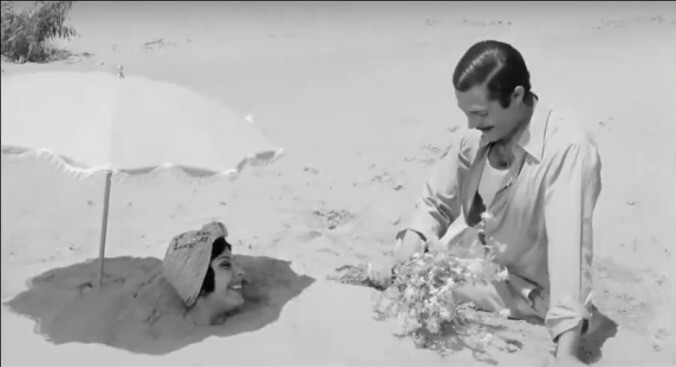
Federico Fellini favorite Marcello Mastroianni stars in Divorce Italian Style as a Sicilian baron undergoing a midlife crisis. He feels smothered by his wife Daniela Rocca, a lightly mustachioed woman with a witchy laugh and a ravenous sexual appetite, and he still sees himself as a desirable catch, able to turn young ladies’ heads with his wealth and good looks. Mastroianni is especially attracted to his teen cousin Stefania Sandrelli, but being Catholic, he can’t do much about it. His best bet is to catch his wife with another man, kill her, and plead “crime of passion.” So he goes looking for a man who might want to sleep with Rocca. That plot description could fit farce or noir, and Divorce Italian Style is a little of both, with the noir elements coming through Mastroianni’s whispered flashback narration and dark fantasies. []
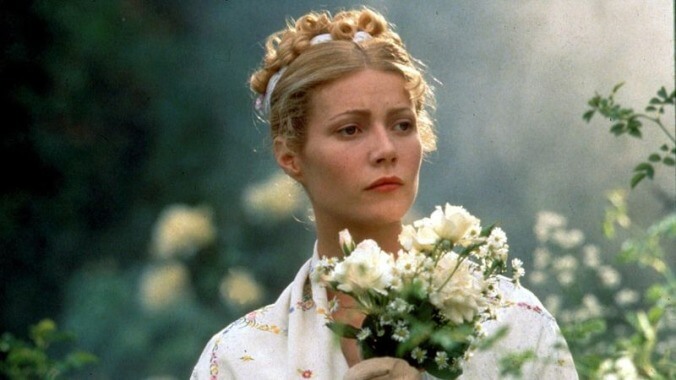
Sanding down some of its source material’s sharper edges, Emma remains the epitome of the mid-’90s Miramax period piece; it’s a light, fluffy confection whose liveliness and good humor outweigh its lack of depth. Adapting Jane Austen’s revered novel, screenwriter-director Douglas McGrath takes a spirited approach to the 19th-century English tale of young Emma Woodhouse (Gwyneth Paltrow), who spends a year attempting to play matchmaker for a number of acquaintances, the most prominent being Harriet Smith (Toni Collette), a new friend just starting out in high society. Emma’s efforts to set up Harriet with local minister Mr. Elton (Alan Cumming) help kick-start a roundelay of romantic pairings and partings, which eventually come to include Emma’s own relationships with both Frank Churchill (Ewan McGregor), the coveted son of her governesses’ new husband, and George Knightley (Jeremy Northam), her close family friend. McGrath stages his story with little aesthetic flair, and from today’s perspective, his film’s production design proves far less convincing than that of . Still, the director’s fondness for extended takes allows Austen’s memorable characters, and his cast’s uniformly compelling performances, to command center stage, and his script effectively channels the novel’s atmosphere of amorous anticipation, longing, and confusion. []
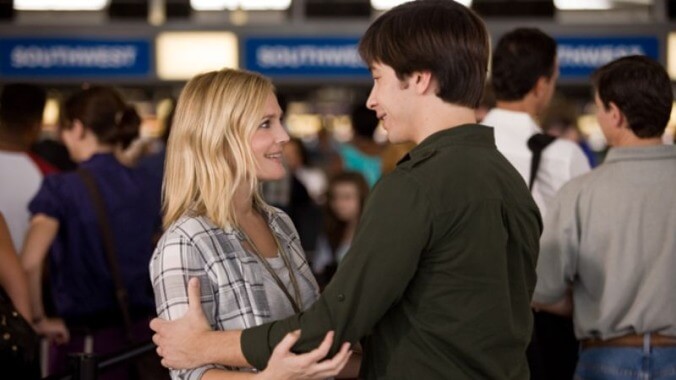
By Hollywood rom-com standards, it’s also blessedly low-concept: When they meet in a New York City bar, Drew Barrymore and Justin Long are trying to get footholds in dying industries. She’s an intern for a daily newspaper that’s shedding staff, he’s a low-level A&R guy for a music label. Though Long is still smarting from a failed relationship, Barrymore quickly proves better than a rebound mate, and the two share six banter-filled weeks, nearly falling in love. When a job opportunity takes Barrymore to San Francisco, the pair enters into a long-distance relationship that tests their bond, especially since neither of them can afford to fly out to see the other. That might all sound weirdly like a situation that would happen in real life, which is one of the areas where Going The Distance deviates from the norm. LaTulippe and director Nanette Burstein (American Teen), a documentary filmmaker making her narrative debut, aren’t interested in reinventing the genre, but they ground it in a plausible situation and let it sink or swim on the strength of the performances and some very funny dialogue. Freed from the timidity of shooting for a PG-13 rating, Charlie Day, Jason Sudeikis, Christina Applegate, and a scene-stealing Jim Gaffigan, as Applegate’s defeated husband, are able to cut loose as the obligatory advice-givers, and Barrymore seems more engaged and charming than usual. It all looks so effortless, it’s a wonder that movies like Going The Distance are such an anomaly. []
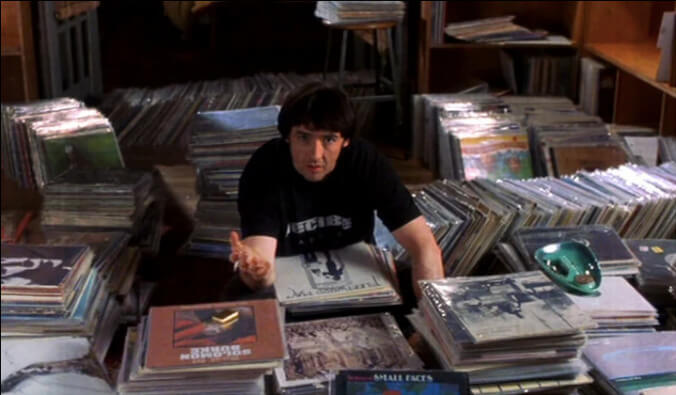
The Chicagoans at Rob’s (John Cusack) store, Championship Vinyl, are “professional appreciator”s from afar who can barely hold it together in conversation with rising singer-songwriter Marie De Salle (Lisa Bonet). It’s a much more grown-up male adolescent fantasy (i.e. Rob winds up having a one-night stand with Marie) where the specters of age, responsibility, and purpose are always hovering around while only occasionally impeding on Rob’s daytime routine of listening to music and rattling off personal top five lists, or his off-hours regimen of listening to music and rattling off personal top five lists. High Fidelity is a film colored by a love of music, but it’s also about love love, the complexities of romantic relationships and the path toward becoming a better, fuller person. []
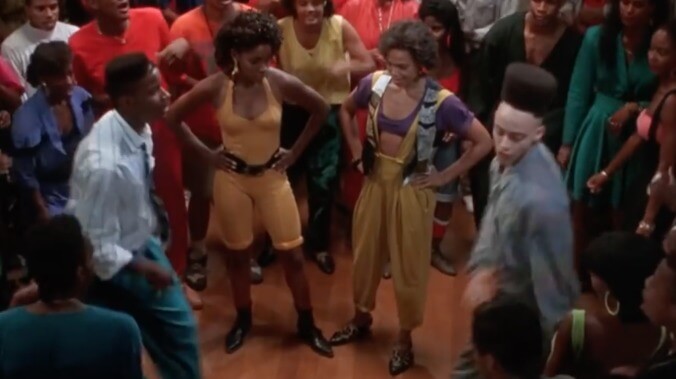
House Party premiered at the 1990 Sundance Film Festival, part of a pack of extremely promising debut features that also included Whit Stillman’s , Hal Hartley’s , and Wendell B. Harris Jr.’s , which took home the top prize. But House Party was different: It didn’t aim for the arthouse crowd, but for multiplex audiences. The fact that it became a very profitable hit, spawning sequels and imitators, didn’t have much to do with the fact that it had picked up awards at Sundance for writer-director Reginald Hudlin and cinematographer Peter Deming, later known for his work with David Lynch. (Coincidentally, Lynch’s own debut, , gets name-checked.) With the exception of a homophobic tangent—which the movie’s been rightly called out on since it first hit Park City—it’s as fun as unapologetic teensploitation gets. Hudlin didn’t subvert or reinvent a form that had been around since enterprising drive-in producers figured out they could cash in on rock ’n’ roll. He just did it better: a sort of clean-cut early ’60s movie for the R-rated early ’90s, right down to the shaggy-dog plot, the bully villains, and the cast of high schoolers who all look like they’re in their mid-to-late 20s. []
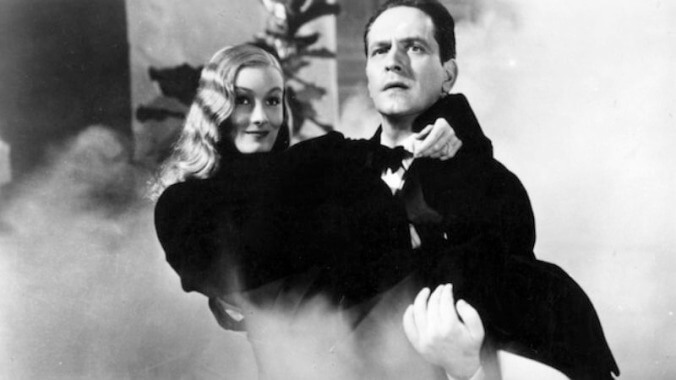
I Married A Witch stars Veronica Lake as Jennifer, a witch with an origin story more appropriate for a horror film: She and her father (Cecil Kellaway) were both burned to ash during the Salem witch trials. In revenge, the still-sentient pair places a spell on the family of the man who exposed them. Hundreds of years later, Jennifer and her father return to corporeal form to further torment descendant Wallace Wooley (Frederic March). Specifically, she aims to help along her curse that dooms every Wooley male to marry the wrong woman. Wallace, a candidate for governor, is already well on his way, engaged to Estelle (Susan Hayward), but Jennifer endeavors to seduce and abandon him anyway. She only further complicates matters by actually developing feelings for her prey, much to the chagrin of her vengeful father. Various transmogrifications, revelations, and general shenanigans ensue. I Married A Witch is fairly heavy on incident for a 77-minute movie; it has the bones of a screwball comedy, but with a more whimsical soul. []
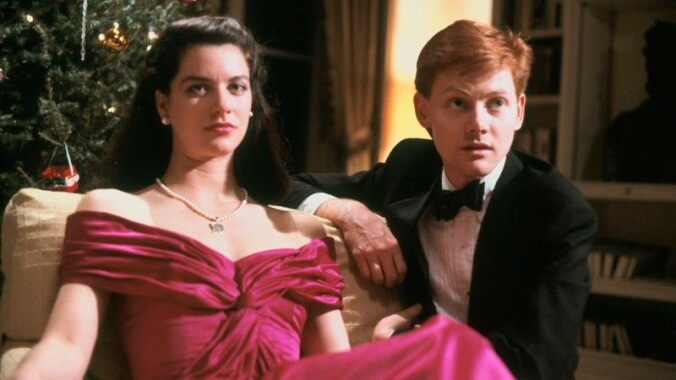
A title card at the beginning of Whit Stillman’s debut feature, Metropolitan, identifies the time period merely as “not so long ago.” At the time—the film was originally released in 1990—Stillman was looking back roughly 20 years, to the early 1970s; of course, many more years have passed since then. It doesn’t really matter, though, as Metropolitan has always felt like a movie that exists in a strange, insular little bubble of its own, utterly divorced from the personal experience of virtually anyone who watches it. The film’s enduring appeal lies in its sardonic yet warmly affectionate portrait of New York’s debutante-ball subculture, which has rarely appeared onscreen before or since. Few will identify with the ludicrously wealthy characters, who speak in perpetual bon mots and are virtually never seen in anything but formalwear, but their stubborn refusal to evolve with the culture—forever sounding as if they’re in one of the Jane Austen novels they so earnestly discuss—is part of their charm. Shot on a shoestring, Metropolitan doesn’t actually show the balls themselves, and it doesn’t really have a narrative to speak of. Mostly, it’s a series of hilariously mannered conversations at the ball’s after-parties, involving a group of Upper East Siders. Some minor intrigue derives from the presence of Stillman surrogate Tom Townsend (Edward Clements), an Upper West Side resident who’s adopted by the gang when he and they try to hail the same cab. Tom is probably at least in the 85th percentile financially himself, but he’s a pauper compared to the UHB crowd, and he also fancies himself to be vehemently opposed to the self-satisfied ostentation of high society. Nonetheless, he keeps coming around all week, and slowly begins to realize that Audrey (Carolyn Farina), the most sensitive and literary-minded of the debs, has developed feelings for him. []
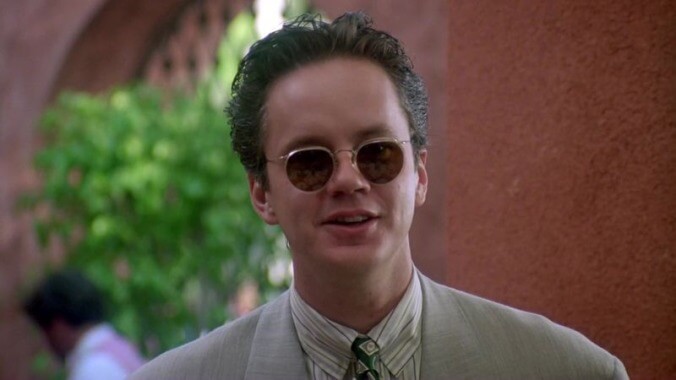
Robert Altman’s adaptation of Michael Tolkin’s The Player—a novel that eviscerates ’80s Hollywood—begins with a lengthy joke that only cinema could make. As a studio security chief (Fred Ward) bitterly complains about the era’s ADD aesthetic (“All this cut, cut, cut,” he grumbles, blissfully unaware that Michael Bay lurks in his future) and raves about the opening of Touch Of Evil, Altman and cinematographer Jean Lépine execute a ludicrously complex seven-minute shot that wanders all over the lot, even peeking through several windows at pitch meetings in progress. Many of The Player’s major players are introduced over the course of this sequence, and there are some magnificent jokes, including Buck Henry’s pitch for The Graduate: Part 2 (or maybe The Post-Graduate) and Alan Rudolph describing a project as “politely political, but with a heart, you know, in the right place.” (That Rudolph hasn’t been in a film since 2002 makes the latter sting a bit more today.) Still, the main gag is the shot itself, which seeks to impress even as it pokes fun at its own ambition. []
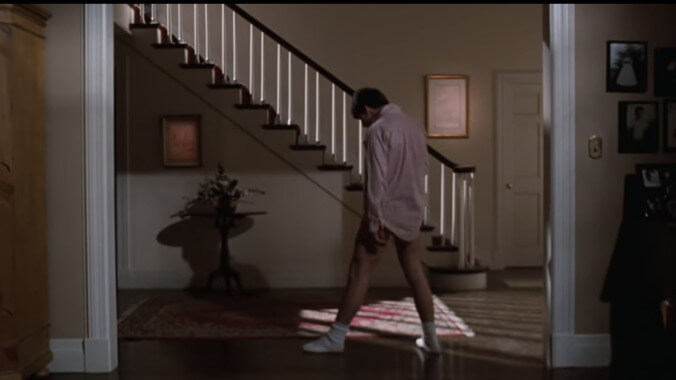
A coming-of-age film that turns Tom Cruise’s high-school senior into an accidental pimp after he nervously hires a call girl (Rebecca De Mornay), is partly about how teens grow up, discover desire, and move past the little-kid images that line their parents’ homes. But the “business” half of the title is just as important. Forced to embrace his role as a panderer after wrecking his dad’s Porsche, Cruise winds up looking at capitalism at its rawest as he joins De Mornay in the “shameless pursuit of material gratification.” But eventually, the business gets the better of him, and Cruise is troubled by the suspicion that his relationship with De Mornay might mean nothing more to her than a dollar amount, since she’s so adept at putting prices on everything else. Risky Business found its audience as part of a wave of teen comedies, but Cruise’s character has more in common with Dustin Hoffman in The Graduate than any of the Porky’s horndogs. As the film progresses, he clearly realizes his soul is at stake. If audiences in that material-world decade paid attention, they probably saw a bit of themselves up there. []
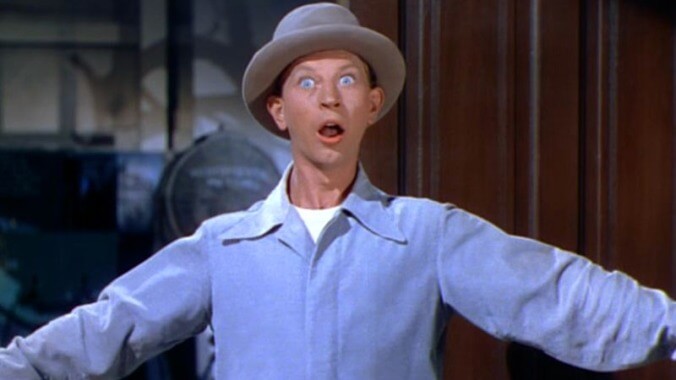
Singin’ In The Rain defies an auteurist reading. As the film’s star, co-director, and co-choreographer, Gene Kelly would seem like a likely candidate for authorship, but the fact that Kelly shares the last two roles with Stanley Donen reveals the film’s collaborative nature. Similarly, songwriter-turned-producer Arthur Freed could rightly be singled out for his part in its creation, since he came up with its concept of a film that would showcase the songs he’d co-written with Nacio Herb Brown. Finally, screenwriters Betty Comden and Adolph Green can claim much of the credit for Singin’ In The Rain’s success, since they turned a mercenary assignment into an enduring work of art. Ultimately, however, as the audio commentary for the double-disc Singin’ DVD suggests, the film represented a triumph of the studio system rather than the genius of a single powerful vision. Faced with the unenviable task of building a movie around Brown and Freed’s dated songs, Comden and Green hit upon the idea of making the film a nostalgic period piece, a move that allowed them to gently send up the songs’ Tin Pan Alley corniness while reveling in their simple power. Set during film’s awkward transition from silence to sound, Singin’ stars Kelly as a vaudevillian turned movie star whose successful series of films with Jean Hagen seems doomed to end with the arrival of sound; Hagen’s abrasive, squeaky voice suddenly becomes a problem when audiences demand to hear as well as see their idols. Caught in the angry tide of shifting public tastes, the studio behind Kelly and Hagen’s latest film decides to make it a sound picture and then a musical, and fresh-faced ingenue Debbie Reynolds is enlisted to overdub Hagen’s lines. Escapism raised to the level of art, Singin’ In The Rain inventively satirizes the illusions of the filmmaking process while celebrating their life-affirming joy. []
 Keep scrolling for more great stories from The A.V. Club.
Keep scrolling for more great stories from The A.V. Club.
